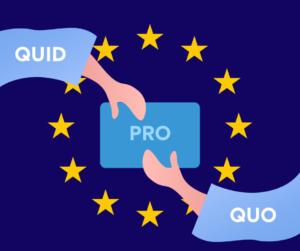Headquarters: Svetog Nauma 7, 11000
Office address: Đorđa Vajferta 13, 11000
Phone:: +381 11 4529 323

The COVID-19 pandemic caught the world – and the EU – unprepared. Taking advantage of the Union’s moment of weakness, decision-makers in Serbia launched a systemic campaign aimed at diminishing the EU’s credibility and justifying Serbia’s existing “multi-seat” foreign policy by extensively focusing on Chinese aid.
A critical juncture took place on 15 March, when the President of Serbia, Aleksandar Vučić, addressed the nation during an emergency televised broadcast, proclaiming that “European solidarity does not exist”. The immediate cause for this statement was the passing of a European Commission regulation making it more difficult to export certain medical equipment outside the EU. Adding that European solidarity was but “a fairy tale”, the President of Serbia sent shock waves through Serbia as well as the international community, while consciously omitting the fact that the EU has been the largest donor by far to Serbia since 2000, including in its total donations to the health sector, as well as in providing assistance during the catastrophic 2014 floods. Although there were no other harsh statements of this kind, it does not mean that this was a one-time, hasty, and/or isolated outburst.
During the entire state of emergency in Serbia, there was a visible campaign to diminish the importance of aid from the EU – from public billboards expressing gratitude to the Chinese chairman, to the limited media attention and modest statements of gratitude by Serbian officials. Although the EU has allocated more funds than any other power to help Serbia during the pandemic,[1] it was left in the background, while China took centre stage, presented as “irreplaceable” and the only ally on whom Serbia can depend in its time of need. What, therefore, was the result of this misrepresentation of the Union during the pandemic? A deceived public. And of consequence for Serbia’s accession process? Probably reduced support for EU membership. In other words, the damage has already been done, and it is questionable whether the EU will be able to restore its credibility in Serbia, which had already been fragile even prior to the pandemic’s outbreak. In addition, it remains unknown what share of China’s assistance was made in the form of donation and what was in fact paid from Serbia’s state budget (and under what terms).[2]
How did we end up here? What was at stake was the clash of narratives, where the EU was presented as a partner, with whom adequate relations are possible based on a rational calculus, while China was portrayed as a sibling, upon whom Serbia can always depend. The reaffirmation of this discourse in the public at the very least represents an example of diplomatic frivolity displayed by Serbian authorities, especially if it is taken into account that achieving membership in the Union remains, at least declaratively, their strategic priority. However, the described behaviour of Serbia during the COVID-19 pandemic should not come as a surprise: instead it only represents a continuation of many years of practicing insincere relations with the EU and a feeble commitment to membership. Moreover, EU assistance has traditionally been seen, to quote Professor Filip Ejdus from the University of Belgrade’s Faculty of Political Science, as “the assistance of a wealthy stepmother, who gives much less than she could and nags much more than she should.”[3]
All things considered, it can be concluded that these recent statements of the President of Serbia seem to have had a profound impact on the public, as his 15 March address has continued to circulate on television and in social media to this day. The message of this speech was then systematically maintained by continuously downplaying the importance of EU assistance while disproportionally praising China. The continuation of this trend can be expected, as well as the strengthening of the relations between Serbia and China, especially bearing in mind that China’s President Xi Jinping recently accepted an official invitation from President Vučić to visit Serbia.[4]
For an extensive analysis of China’s activities in Serbia before and during the COVID-19 pandemic, as well as their impact on Serbia’s EU perspective, you may also see the policy brief on this subject recently published by the European Policy Centre (CEP).
[1] EU Delegation to Serbia, “EU Partnership with Serbia: EU Best Partner and Biggest Donor for 20 Years – and in the Front Line against COVID-19”, 2020, available at: https://europa.rs/eu-partnership-with-serbia-eu-best-partner-and-biggest-donor-for-20-years-and-in-the-front-line-against-covid-19/?lang=en
[2] Strahinja Subotić and Miloš Janjić, “What have we learned from the COVID-19 crisis in terms of Sino-Serbian relations? China’s influence in Serbia will grow as much as the EU allows it to”, European Policy Centre (CEP), 2020, available at: http://cep-old.local/wp-content/uploads/2020/04/What-have-we-learned-from-the-COVID-19-crisis-in-terms-of-Sino-Serbian-relations.pdf
[3] N1, „Ejdus: Evropska pomoć se u Srbiji doživljava kao pomoć bogate maćehe“, 2020, available at (in Serbian): http://rs.n1info.com/Vesti/a585748/Ejdus-Evropska-pomoc-se-u-Srbiji-dozivljava-kao-pomoc-bogate-macehe.html
[4] B92, “Chinese President Xi Jinping announced his visit to Serbia in talks with Vucic”, 2020, available at: https://www.b92.net/eng/news/world.php?yyyy=2020&mm=04&dd=14&nav_id=108326